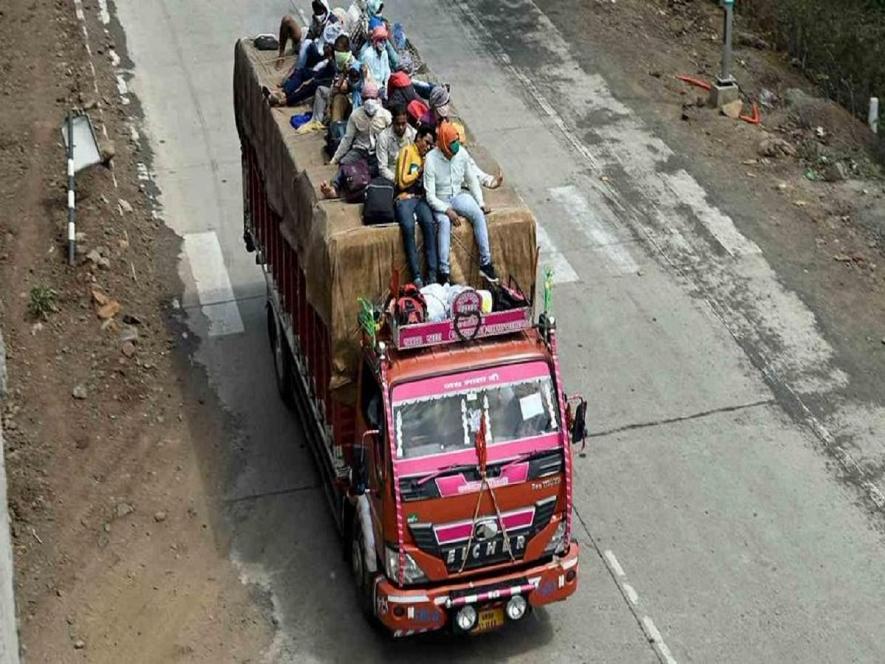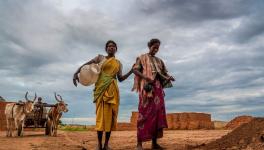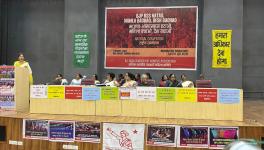A Cold and Remote State of Cynicism

Image for representational use only.Image Courtesy : Deccan Herald
One feels a sense of profound shame if not depression at the way the country, or rather the state, is treating the people it purports to represent. This was dramatically revealed during the great migrant exodus, which hardly needs any elaboration. What, however, passed below the radar is the solicitous concern it displayed towards the propertied classes, especially those who thrived on their labour.
Until public outrage became stormy, the difference of attitude in treatment of the two sections of society was flagrant. There was immediate concern at the losses to business, but tardy and half-hearted response to the immense misery and desperation of the labouring poor. The gloom is deepened by scenes in which, in the name of law and public order, brutal violence had been inflicted on the migrants.
At the moment there is a sweeping surge of public outrage vented through mass protests and turbulent marches against racial inequality and race oppression embodied by the police in America. The slogan Black Lives Matter is emblazoned in banners and even T-shirts of crowds in their thousands. But here the police are given a free hand in establishing the most oppressive, deceitful and disgusting regime of barbarity in the name of law. The most blatant distortion of facts, systematic evasion of glaring evidence in weird cases of some far-fetched conspiracy and brutal interrogation and torture of opponents and critics of the government are taking place in full view of the public in some states and regions.
But those under the protection of the government get away with open and gross violation of the law. The scandal of tuning out the outrageously provocative remarks of Kapil Mishra on the eve of the Delhi violence and booking protesting students and scholars on most absurd charges of murder and conspiracy are instances of rampant police bias that no longer seem to matter. There is no resounding call for a review and reform of the police in our democracy.
The injustice and utter contempt that characterise the treatment of the common people today belong to the same category. For want of expeditious response by the state, migrant workers were kept confined to regions long after the spread of infection there. And when at long last they were provided public transport and enabled to reach their homes they get branded as “Corona suspects” by panicky neighbours. Little is done by the government to change the perception, obviously in a move to evade responsibility for its failure to act in time.
In Europe we have seen heads of capitalist states fervently affirming that saving lives is their first priority. Die-hard rightist Boris Johnson handed out four months’ pay in advance to every resident of Britain whereas our much-vaunted 20 lakh crore package includes only 20 thousand crore for such cash relief to the poor in extreme stress.
The idea here is not to sing a litany of wrongs but to underline the sheer illegitimacy of such politics. Right here in Assam, newspapers and TV channels—hard-pressed in these times to garner some revenue and not rub the government the wrong way for fear of massive retaliation—have been forced to show scenes of extreme misery in many different areas. Among instances one might cite hutments of villagers in outlying regions wrecked and crushed by herds of wild elephant who have been driven mad by hunger as reckless mining and illegal tree-felling have devastated forests, and heaving turbulent waters of rivers in flood sweeping away both two-room houses by the dozen and some unfortunate children or elderly people, because the numerous embankments on the Brahmaputra and its tributaries are so constructed as not even to last a season by rapacious contractors and corrupt officials under political protection.
The party that came to power by making a big issue of corruption is now mired in it and the most shameful part of it is the widespread plunder of funds released for relieving rural distress. The Baghjan disaster is only a lurid illustration of the deep-rooted violation of the norms of public life. The approach to the Covid-19 pandemic betrays the same cynicism. Like the Centre the state government also ignored the urgent plea of WHO to undertake widespread random testing. Instead, it confined itself to selective testing of those with obvious symptoms.
Unlike some other state governments, it seemed to have no idea of the problem to be posed by lakhs of migrant youths rushing home at the fag-end of Lockdown-1. By that time some of them had contracted the disease for no fault of their own. Instead of admitting a major failure of state initiative, the tendency was to put the blame on the poor migrants. There is some ambiguity here in the attitude towards the migrants. There is an underlying strain of unease and suspicion about them as carriers of the disease as well as some sense of solidarity with them as kinsmen, friends and neighbours. The government exploits the nervousness and packs them off to quarantine centres with poor facilities that put inmates under strain. Desperate inmates at times break out and hide leading to frantic man-hunts. A few have been driven to suicide.
This has been entirely a result of faulty planning and preparation, but the victims are demonised instead. Now the numbers of Covid patients are beginning to soar and because of the top-down approach common people are only dimly aware of the necessary precautions and they tend to observe them casually. They then bring down on their heads brutal state reprisal.
Newspaper headlines scream that officially funds for various state ministries have been blocked under the pretext that the government resources have run out. The reason is unclear. Only the other day the state government seemed jubilant that the central government has at long last released its share of the GST. What has gone wrong? On the other hand the government is persuading villages to provide food for those in nearby quarantine centres, with the government only guaranteeing only construction of centres, deployment of medical staff and supply of medicines and accessories. It is unclear how long a village will be required to provide food in these times of hardship.
There is some trumpeting of online teaching in the absence of regular schooling. But as Prof Indranee Dutta, the former director of the Omeo Kumar Das Institute of Social Change and Development, has pointed out in a detailed report, as many as 40% of students will be shut out as they don’t own smartphones. The alternatives suggested by various teachers’ organisations are brushed off, presumably because these might cast a shadow on the grandiose plans for online teaching.
There is also the nagging problem of varying levels of academic capabilities among different groups of students. The situation is complicated by the government’s unbending insistence on its centralised model of management. There is on the one hand the inescapable need to carry on basic economic production and on the other the frequent imposition of lockdowns as the sovereign remedy for spreading infection. Why has a balance not been thought out?
These anomalies and lapses tend to bring under deep focus a fundamental question: is the state abdicating its role as directed by the Constitution?And is it clinging to power only to act as a gendarmerie for a privileged minority? Or that it has no genuine intention to honour its promises?
In that case how will the radical scepticism of the alleged “anti-national” groups regarding our state be answered? Will they win the argument by default?
The author is a socio-political commentator and cultural critic. The views are personal
Get the latest reports & analysis with people's perspective on Protests, movements & deep analytical videos, discussions of the current affairs in your Telegram app. Subscribe to NewsClick's Telegram channel & get Real-Time updates on stories, as they get published on our website.
























